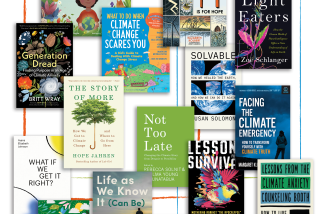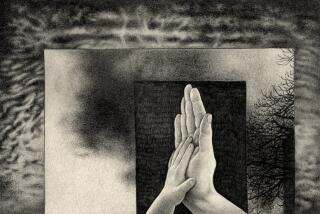The World Is Dying--and So Are You
- Share via
At the heart of the modern age is a core of grief.
At some level, we’re aware that something terrible is happening, that we humans are laying waste to our natural inheritance. A great sorrow arises as we witness the changes in the atmosphere, the waste of resources and the consequent pollution, the ongoing deforestation and destruction of fisheries, the rapidly spreading deserts and the mass extinction of species.
All these changes signal a turning point in human history, and the outlook is not particularly bright. The anger, irritability, frustration and intolerance that increasingly pervade our common life are symptoms associated with grief. The pervasive sense of helplessness and numbness that surrounds us, and the frantic search for meaning and questioning of religion and philosophy of life, are likewise often seen among those who must deal with overwhelming sorrow.
Grief is a natural reaction to calamity, and the stages of grief are visible in our reaction to the rapid decline of the natural world. There are a number of steps that people go though in the grief process. The first stage is often denial: “This can’t really be happening,” a feeling common among millions of Americans. Eighty percent of American adults say they are concerned about the environment, and there is some awareness of the gravity of our situation, yet a widespread awareness has yet to be felt in practical terms. We know the facts, but we’re ignoring them in the interests of emotional survival.
The second stage of grief is often anger. We go into the “I’ll fight it” mode. Many environmental thinkers and activists put a lot of grief energy into constructive work. That energy is a factor in the undeniable successes of environmentalism, yet it is a sign of suffering and is probably a constraint on the intellectual vitality of the movement.
The third stage in the grief process is often despair. We feel that “no matter what I do, it’s still happening.” Because the planetary future seems so grim, it’s likely that many Americans have despaired, turning away from the quest for a meaningful solution.
The final stage of the grieving process, for those who can achieve it, often brings a more hopeful state of acceptance, even serenity. When we emerge from the bottom of despair, we may find the inner strength for a peaceful accommodation to reality. We can continue to take positive actions, but we are no longer in denial, rage or despair.
Even if we face the consequences of our assault on the natural environment, we may still find that the problems are too big, that there’s not much we can do. Yet those of us who feel this sorrow cannot forever deny it without suffering inexplicable disturbances in our own lives. It’s necessary to face our fear and our pain and to go through the process of grieving because the alternative is a sorrow deeper still: the loss of meaning. To live authentically in this time, we must allow ourselves to feel the magnitude of our human predicament.


